Charles E W Bean, Diaries, AWM38 3DRL 606/275/1 - 1918 - 1938 - Part 15
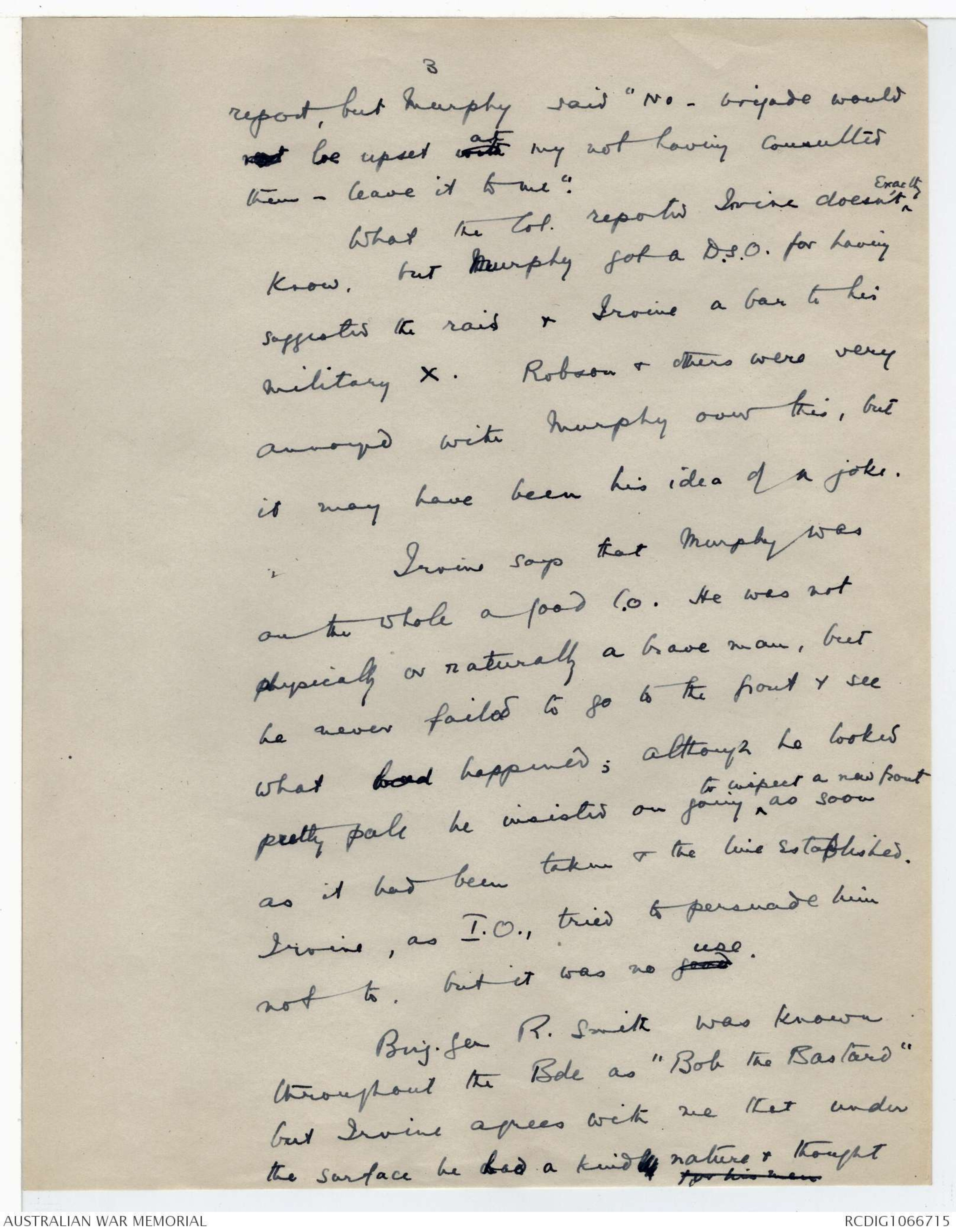
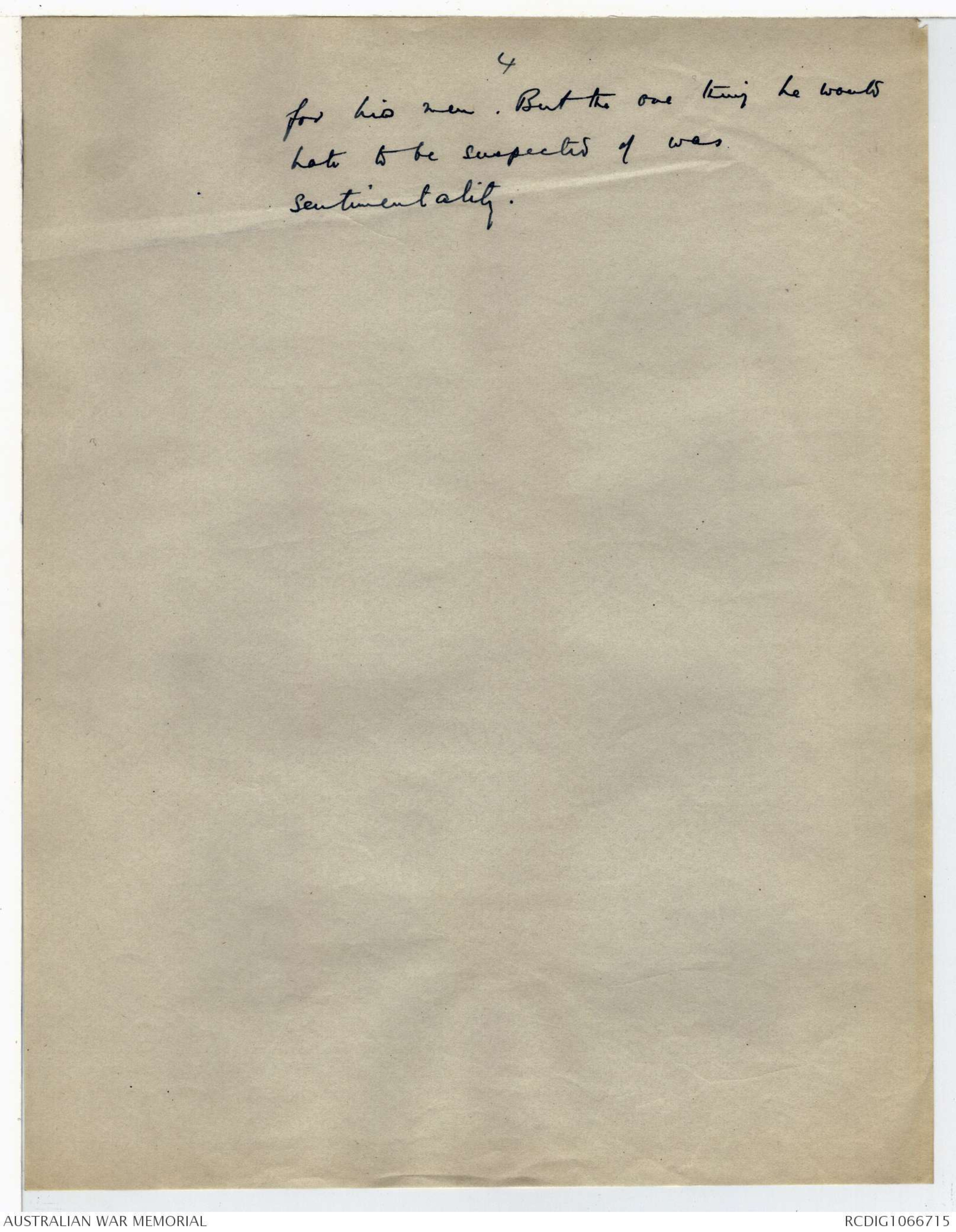
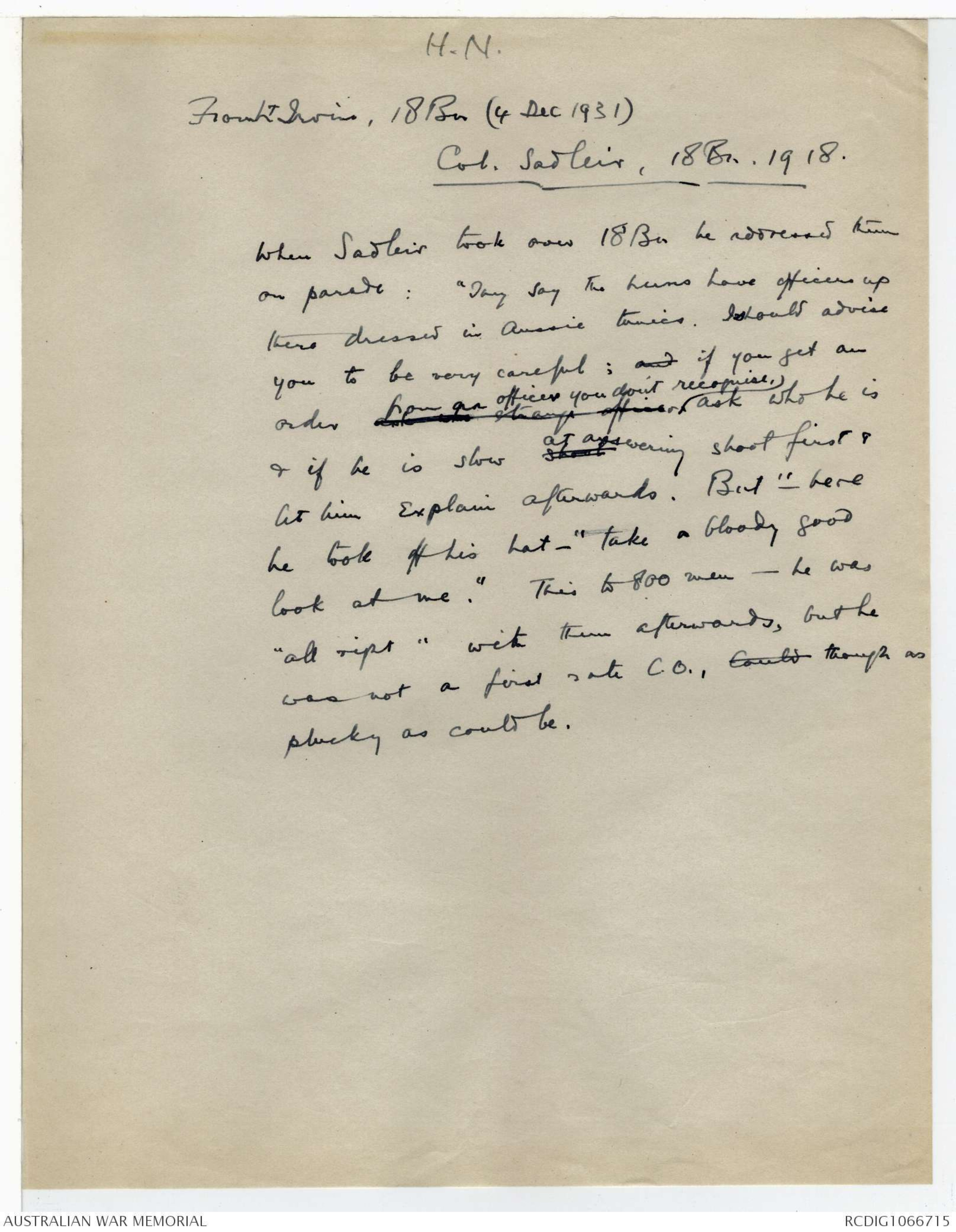
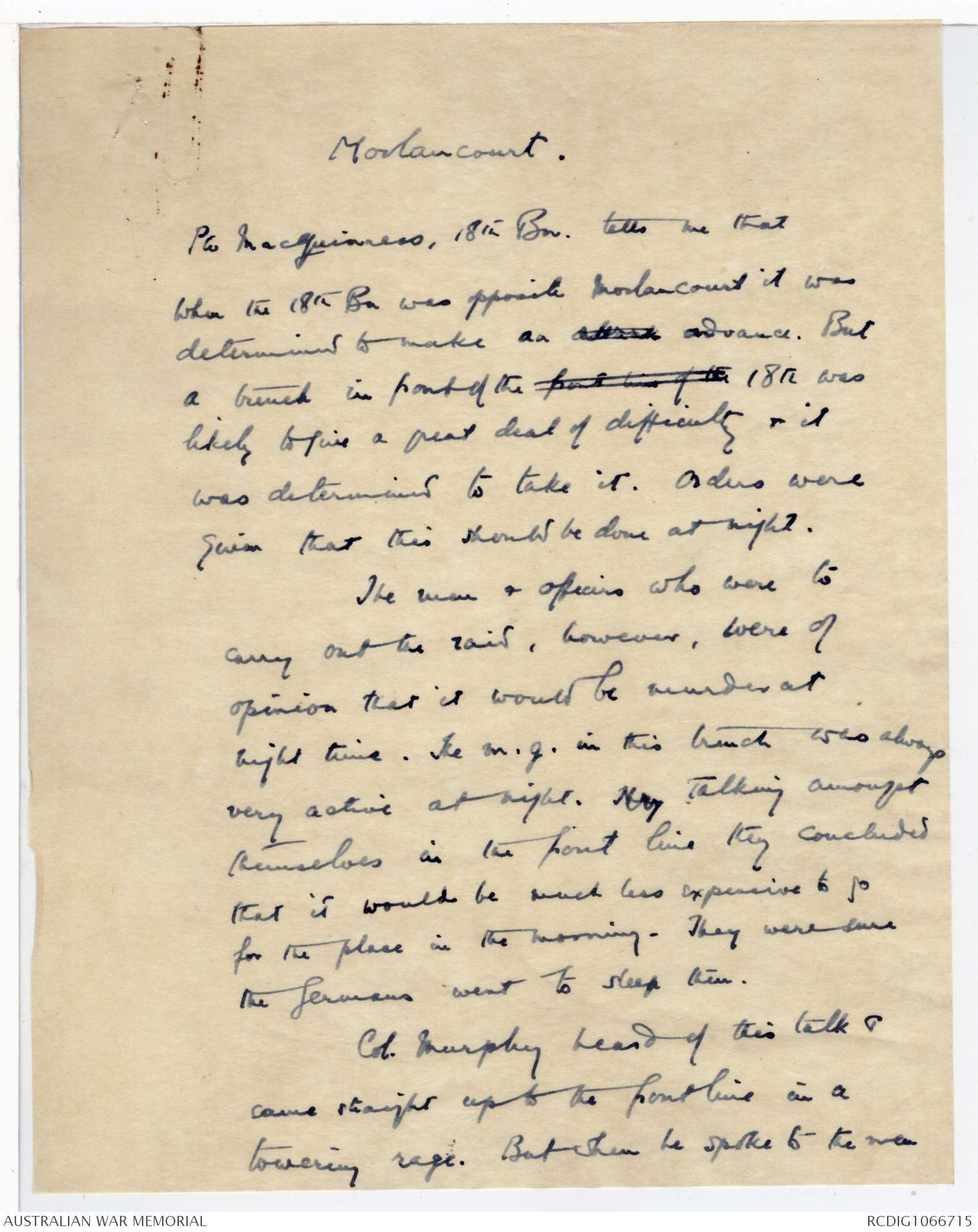
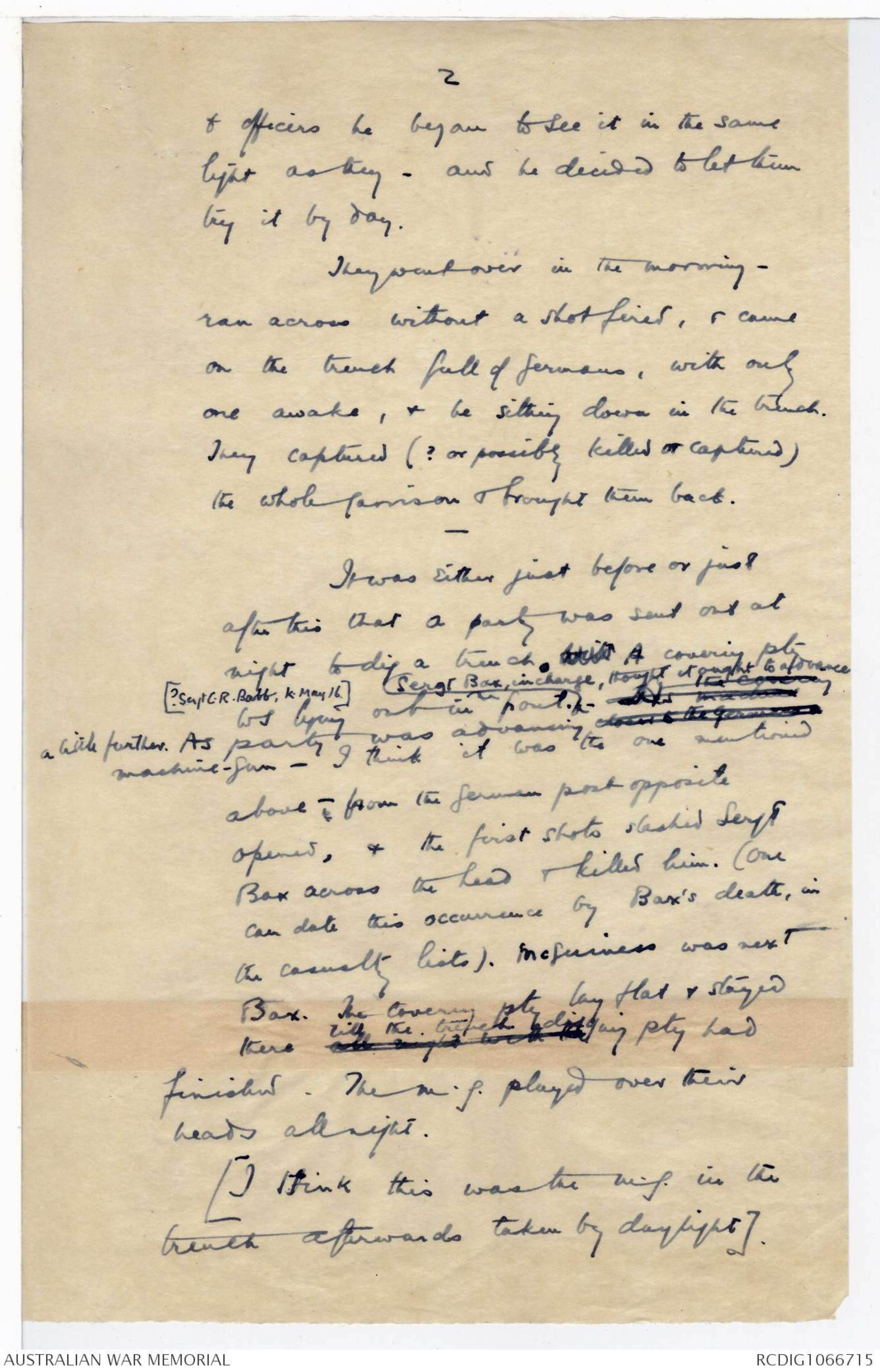
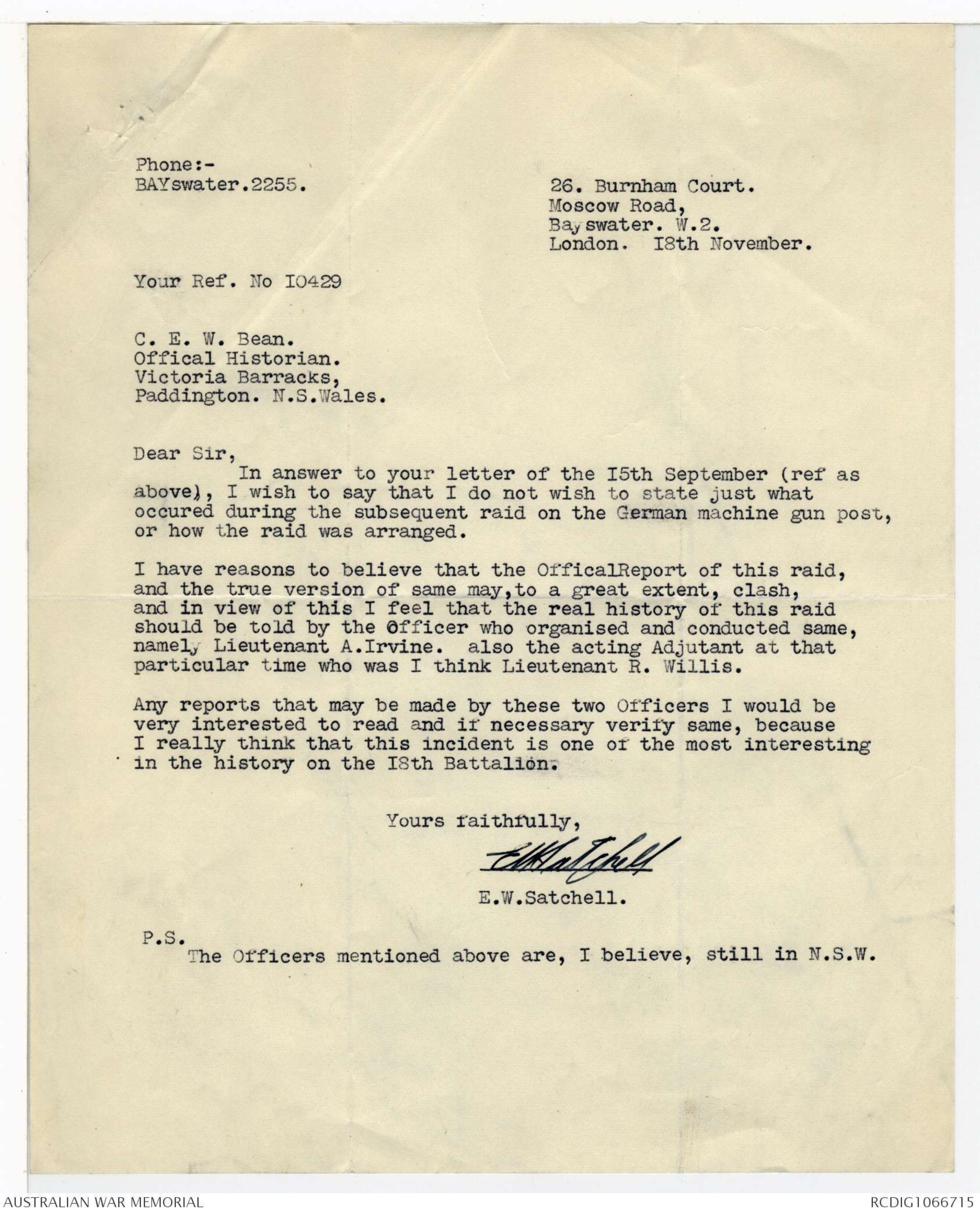
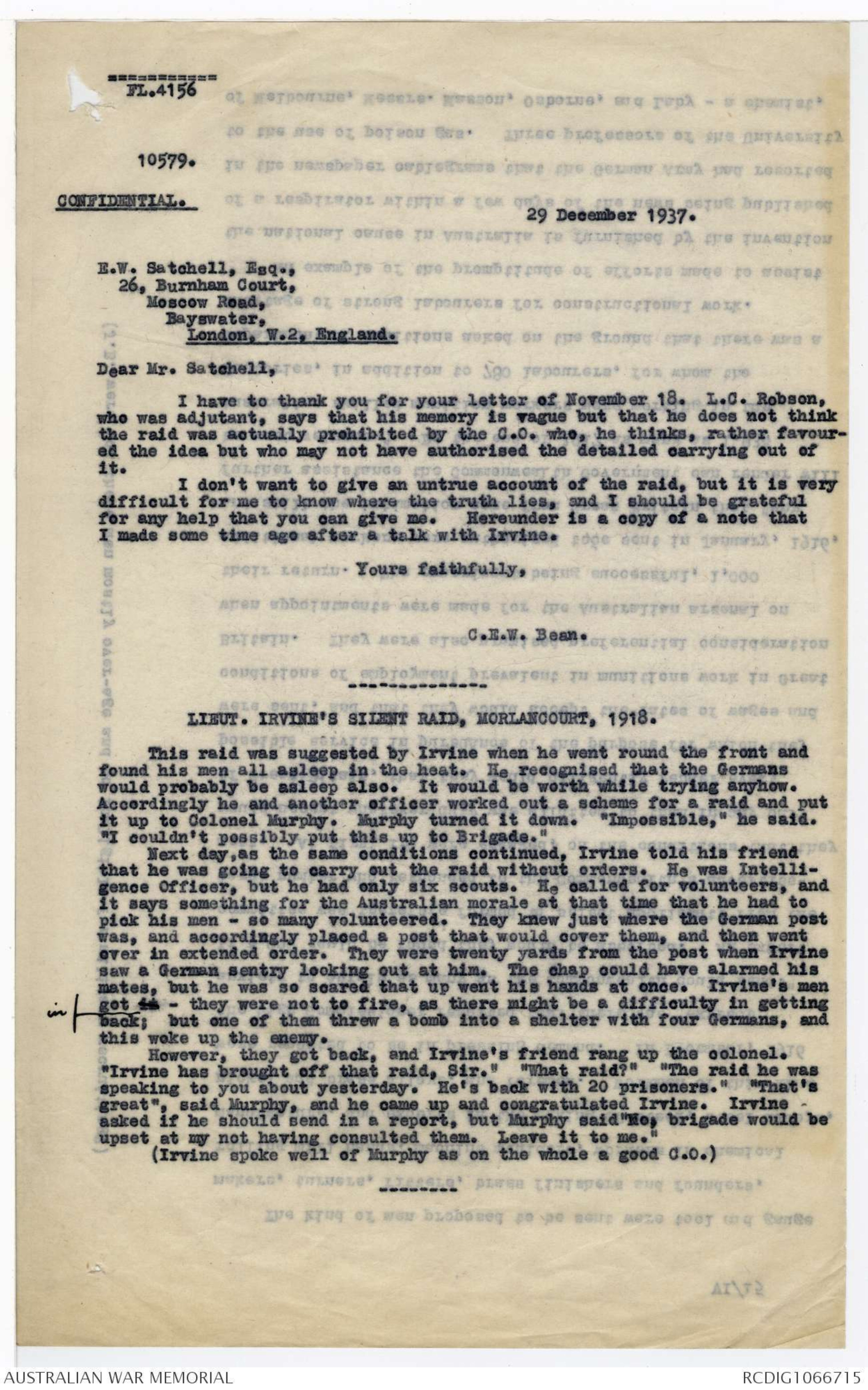
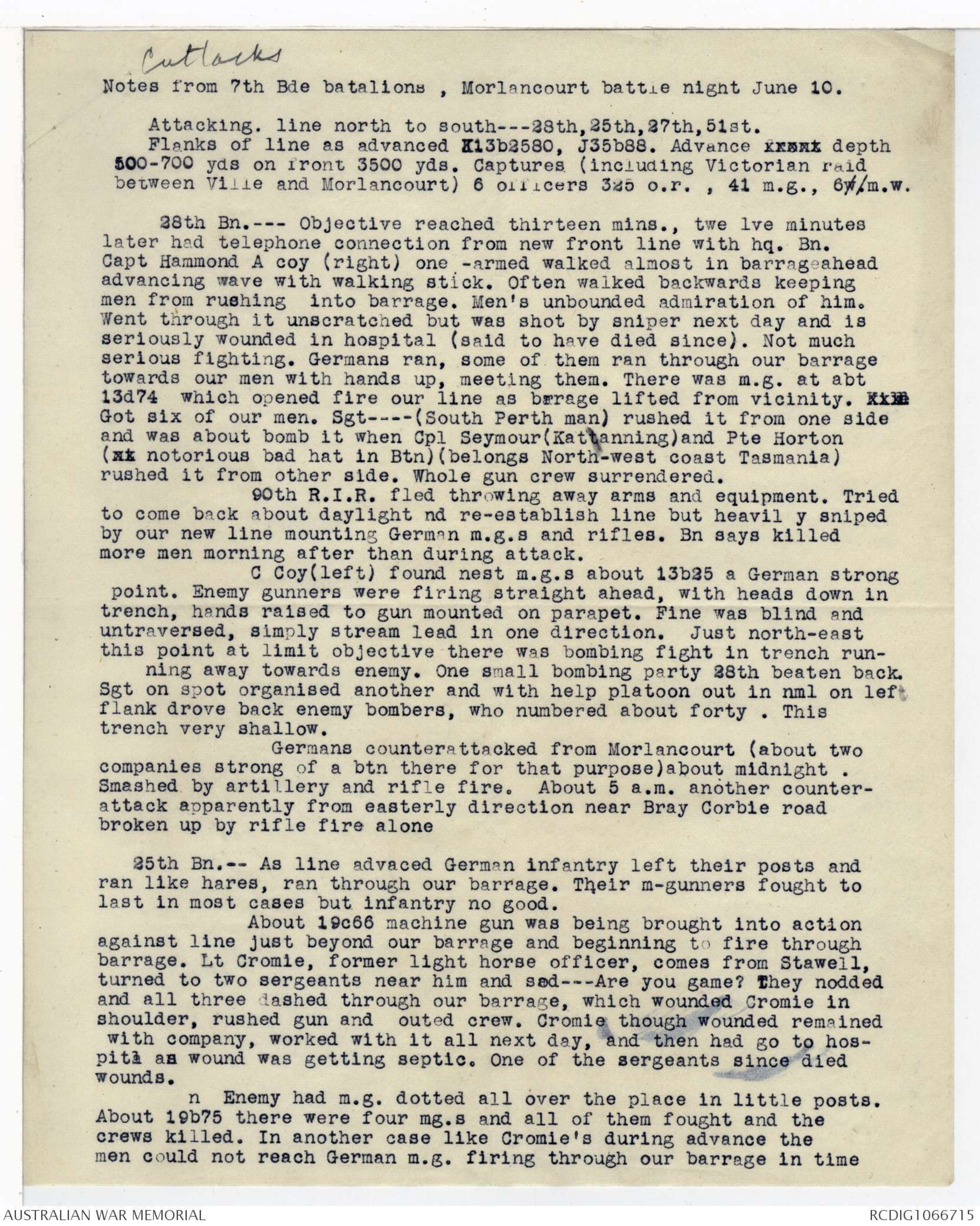
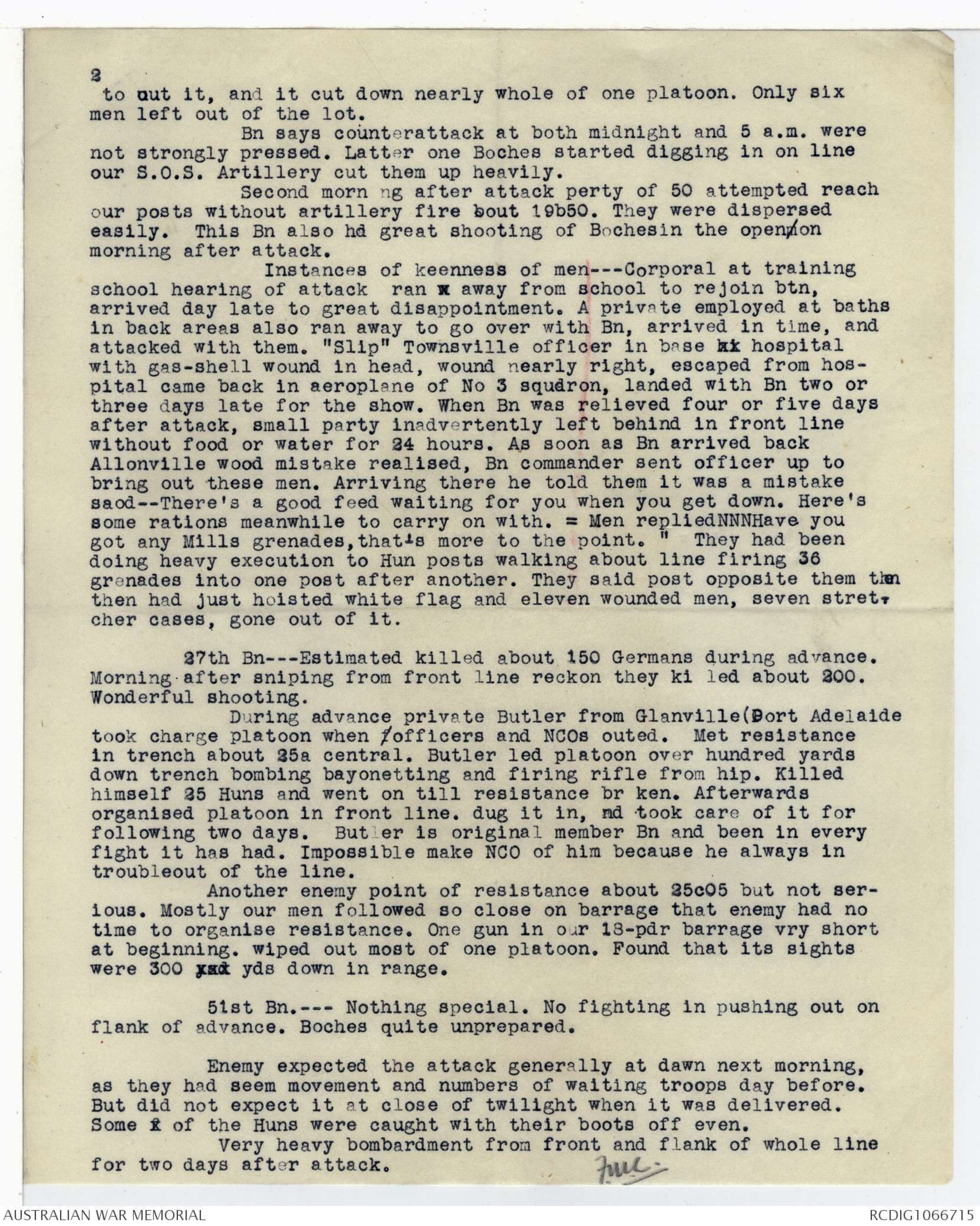
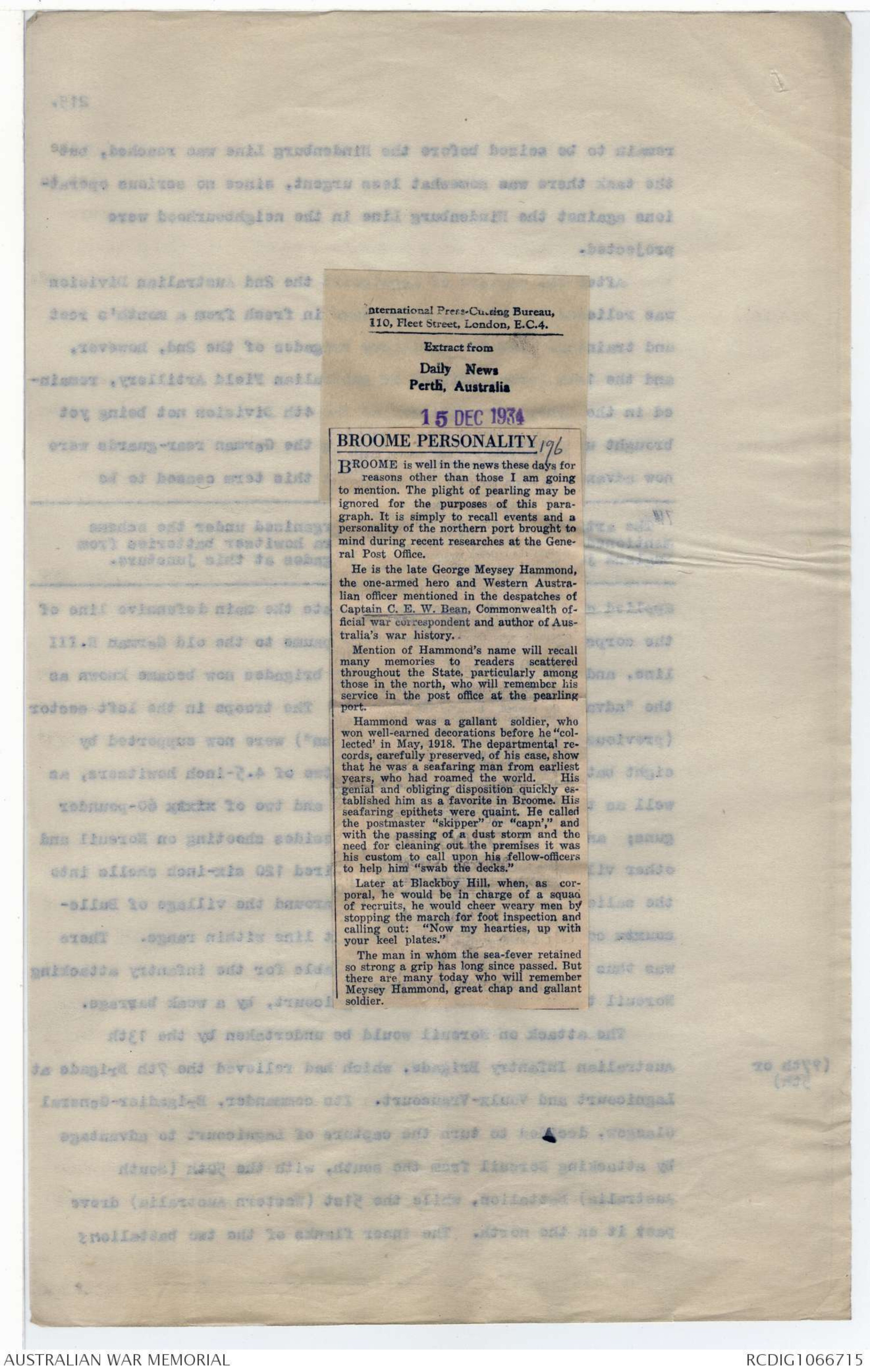
3
report but Murphy saw "No - brigade wouldnot be upset with at my not having consulted
them - leave it to me".
What the Col. reported Irvine doesn't ^exactly
know, but Murphy got a D.S.O. for having
suggested the raid & Irvine a bar to his
Military X. Robson & others were very
annoyed with Murphy over this, but
it may have been his idea of a joke.
Irvine says that Murphy was
on the whole a good C.O. He was not
physically or naturally a brave man, but
be never failed to go to the front & see
what had happened, although he looked
pretty pale he insisted on going ^to inspect a new front as soon
as it had been taken & the line established.
Irving, as I.O., tried to persuade him
not to, but it was no good use.
Brig. Gen R. Smith was known.
throughout the Bde as "Bob the Bastard"
but Irvine agrees with me that under
the surface he had a kindly nature & thoughtfor his men
4
for his men. But the one thing he would
hate to be suspected of was
sentimentality.
H.N.
From Lt Irvine, 18 Bn (4 Dec 1931
Col. Sadleir, 18Bn. 1918.
When Sadleir took over 18Bn he addressed them
on parade: "They say the huns have officers up
there dressed in Aussie tunics. I should advise
you to be very careful; if you get an
order ask the strange officer from an officer you don't recognise, ask who he is
& if he is slow shoot at answering shoot first &
let him explain afterwards. But" - here
he took of his hat - "take a bloody good
look at me." This to 800 men – he was
all right" with them afterwards, but he
was not a first rate C.O., Could though as
plucky as could be.
Morlancourt.
Pte Macguinness, 18th Bn. tells me that
When the 18th Bn was opposite Morlancourt it was
determined to make an attack advance. But
a trench in front of the front line of the 18th was
likely to give a great deal of difficulty & it
was determined to take it. Orders were
given that this should be done at night.
The men & officers who were to
carry out the raid, however, were of
opinion that it would be murder at
night time. The m.g. in this trench was always
very active at night. Xxx Talking amongst
themselves in the front line they concluded
that it would be much less expensive to go
for the place in the morning. They were sure
the Germans went to sleep then.
Col. Murphy heard of this talk &
came straight up to the front line in a
towering rage. But when he spoke to the men
2
& officers he began to see it in the same
light as they - and he decided to let them
try it by day.
They want over in the morning -
ran across without a shot fired, & came
on the trench full of Germans, with only
one awake, & he sitting down in the trench.
They captured (? or possibly killed or captured)
the whole garrison & brought them back.
--
It was either just before or just
after this that a party was sent out at
night to dig a trench. With A covering pty
[?Sergt C.R. Bobb, k. May 16]
ws lying out in front. ^Sergt Bax, in charge, thought it ought to advance at the machine the covering
a little further. As party was advancing closer to the Germans
machine-gun - I think it was the one mentioned
above - from the German post opposite
opened, & the first shots slashed Sergt
Bax across the head & killed him. (One
can date this occurrence by Bax's death, in
the casualty lists). McGiuness was next
Bax. The Covering pty lay flat & stayed
there all night with the till the trench digging pty had
finished. The m.g. played over their
heads all night.
[I think this was the m.g. in the
trench afterwards taken by daylight].
Phone:-
BAYswater. 2255.
26. Burnham Court.
Moscow Road,
Bayswater. W.2.
London. 18th November.
Your Ref. No 10429
C. E. W. Bean.
Offical Historian.
Victoria Barracks,
Paddington. N.S. Wales.
Dear Sir.
In answer to your letter of the 15th September (ref as
above), I wish to say that I do not wish to state just what
occured during the subsequent raid on the German machine gun post,
or how the raid was arranged.
I have reasons to believe that the OfficalReport of this raid,
and the true version of same may, to a great extent, clash,
and in view of this I feel that the real history of this raid
should be told by the Officer who organised and conducted same,
namely Lieutenant A.Irvine, also the acting Adjutant at that
particular time who was I think Lieutenant R. Willis.
Any reports that may be made by these two Officers I would be
very interested to read and if necessary verify same, because
I really think that this incident is one of the most interesting
in the history on the 18th Battalion.
Yours Faithfully,
EWSatchell
E.W. Satchell.
P.S.
The Officers mentioned above are, I believe, still in N.S.W.
==========
FL.4156
10579.
CONFIDENTIAL.
29 December 1937.
E.W. Satchell, Esq.,
26, Burnham Court,
Moscow Road,
Bayswater,
London, W.2. England.
Dear Mr. Satchell,
I have to thank you for your letter of November 18. L.C. Robson,
who was adjutant, says that his memory is vague but that he does not think
the raid was actually prohibited by the C.O. who, he thinks, rather favoured
the idea but who may not have authorised the detailed carrying out of
it.
I don't want to give an untrue account of the raid, but it is very
difficult for me to know where the truth lies, and I should be grateful
for any help that you can give me. Hereunder is a copy of a note that
I made some time ago after a talk with Irvine.
Yours faithfully,
C.E.W. Bean.
---------------
LIEUT. IRVINES SILENT RAID, MOLANCOURT, 1918.
This raid was suggested by Irvine when he went round the front and
found his men all asleep in the heat. He recognised that the Germans
would probably be asleep also. It would be worth while trying anyhow.
Accordingly he and another officer worked out a scheme for a raid and put
it up to Colonel Murphy. Murphy turned it down. "Impossible," he said.
I couldn't possibly put this up to Brigade."
Next day, as the same conditions continued, Irvine told his friend
that he was going to carry out the raid without orders. He was Intelligence
Officer, but he had only six scouts. He called for volunteers, and
it says something for the Australian morale at that time that he had to
pick his men - so many volunteered. They knew just where the German post
was, and accordingly placed a post that would cover them, and then went
over in extended order. They were twenty yards from the post when Irvine
saw a German sentry looking out at him. The chap could have alarmed his
mates, but he was so scared that up went his hands at once. Irvine's men
[*in*] got is - they were not to fire, as there might be a difficulty in getting
back; but one of them threw a bomb into a shelter with four Germans, and
this woke up the enemy.
However, they got back, and Irvine's friend rang up the colonel.
"Irvine has brought off that raid, Sir." "What raid?" "The raid he was
speaking to you about yesterday. He's back with 20 prisoners." That's
great", said Murphy, and he came up and congratulated Irvine. Irvine
asked if he should send in a report, but Murphy said "No, brigade would be
upset at my not having consulted them. Leave it to me."
(Irvine spoke well of Murphy as on the whole a good C.O.)
----------
Cutlacks
Notes from 7th Bde batalions, Morlancourt battle night June 10.
Attacking. line north to south---28th, 25th, 27th, 51st.
Flanks of line as advanced K13b2580, J35b88. Advance xxxxx depth
500-700 yds on front 3500 yds. Captures (including Victorian raid
between Ville and Morlancourt) 6 officers 325 o.r., 41 m.g., 6w.m.w.
28th Bn.-- Objective reached thirteen mins., twelve minutes
later had telephone connection from new front line with hq. Bn.
Capt Hammond A coy (right) one -armed walked almost in barrageahead
advancing wave with walking stick. Often walked backwards keeping
men from rushing into barrage. Men's unbounded admiration of him.
Went through it unscratched but was shot by sniper next day and is
seriously wounded in hospital (said to have died since). Not much
serious fighting. Germans ran, some of them ran through our barrage
towards our men with hands up, meeting them. There was m.g. at abt
13d74 which opened fire our line as barage lifted from vicinity. xxxx
Got Six of our men. Sgt----(South Perth man) rushed it from one side
and was about bomb it when Cpl Seymour (Kattanning) and Pte Horton
(xx notorious bad hat in Btn) (belongs North-west coast Tasmania)
rushed it from other side. Whole gun crew surrendered.
90th R.I.R. fled throwing away arms and equipment. Tried
to come back about daylight nd re-establish line but heavil y sniped
by our new line mounting German m.g.s and rifles. Bn says killed
more men morning after than during attack.
C Coy(left) found nest m.g.s about 13b25 a German strong
point. Enemy gunners were firing straight ahead, with heads down in
trench, hands raised to gun mounted on parapet. Fine was blind and
untraversed, simply stream lead in one direction. Just north-east
this point at limit objective there was bombing fight in trench running
away towards enemy. One small bombing party 28th beaten back
Sgt on spot organised another and with help platoon out in nml on left
flank drove back enemy bombers, who numbered about forty. This
trench very shallow.
Germans counterattacked from Morlancourt (about two
companies strong of a btn there for that purpose) about midnight.
Smashed by artillery and rifle fire. About 5 a.m. another counterattack
apparently from easterly direction near Bray Corbie road
broken up by rifle fire alone
25th Bn.-- As line advaced German infantry left their posts and
ran like hares, ran through our barrage. Their m-gunners fought to
last in most cases but infantry no good.
About 19c66 machine gun was being brought into action
against line just beyond our barrage and beginning to fire through
barrage, Lt Cromie, former light horse officer, comes from Stawell,
turned to two sergeants near him and sad---Are you game? They nodded
and all three dashed through our barrage, which wounded Cromie in
shoulder, rushed gun and outed crew. Cromie though wounded remained
with company, worked with it all next day, and then had go to hospital
as wound was getting septic. One of the sergeants since died
wounds.
n Enemy had m.g. dotted all over the place in little posts.
About 19b75 there were four mg.s and all of them fought and the
crews killed. In another case like Cromie's during advance the
men could not reach German m.g. firing through our barrage in time
2
to out it, and it cut down nearly whole of one platoon. Only six
men left out of the lot.
Bn says counterattack at both midnight and 5 a.m. were
not strongly pressed. Latter one Boches started digging in on line
our S.O.S. Artillery cut them up heavily.
Second morning after attack perty of 50 attempted reach
our posts without artillery fire bout 19b50. They were dispersed
easily. This Bn also hd great shooting of Bochesin the openmon
morning after attack.
Instances of Keenness of men---Corporal at training
school hearing of attack ran x away from school to rejoin btn,
arrived day late to great disappointment. A private employed at baths
in back areas also ran away to go over with Bn, arrived in time, and
attacked with them. "Slip" Townsville officer in base xx hospital
with gas-shell wound in head, wound nearly right, escaped from hospital
came back in aeroplane of No 3 sgudron, landed with Bn two or
three days late for the show. When Bn was relieved four or five days
after attack, small party inadvertently left behind in front line
without food or water for 24 hours. As soon as Bn arrived back
Allonville wood mistake realised, Bn commander sent officer up to
bring out these men. Arriving there he told them it was a mistake
saod--There's a good feed waiting for you when you get down. Here's
some rations meanwhile to carry on with. = Men repliedNNNHave you
got any Mills grenades, that's more to the point." They had been
doing heavy execution to Hun posts walking about line firing 36
grenades into one post after another. They said post opposite them then
then had just hoisted white flag and eleven wounded men, seven stretcher
cases, gone out of it.
27th Bn---Estimated killed about 150 Germans during advance.
Morning after sniping from front line reckon they ki led about 200.
Wonderful shooting.
During advance private Butler from Glanville (Port Adelaide
took charge platoon when fofficers and NCOs outed. Met resistance
in trench about 25a central. Butler led platoon over hundred yards
down trench bombing bayonetting and firing rifle from hip. Killed
himself 25 Huns and went on till resistance br ken. Afterwards
organised platoon in front line. dug it in, nd took care of it for
following two days. Butler is original member Bn and been in every
fight it has had. Impossible make NCO of him because he always in
troubleout of the line.
Another enemy point of resistance about 25c05 but not serlous.
Mostly our men followed so close on barrage that enemy had no
time to organise resistance. One gun in our 18-pdr barrage vry short
at beginning. wiped out most of one platoon. Found that its sights
were 300 yrd yds down in range.
51st Bn. --- Nothing special. No fighting in pushing out on
flank of advance. Boches quite unprepared.
Enemy expected the attack generally at dawn next morning,
as they had seem movement and numbers of waiting troops day before.
But did not expect it at close of twilight when it was delivered.
Some f of the Huns were caught with their boots off even.
Very heavy bombardment from front and flank of whole line
for two days after attack.
F.M.C.
International Press-Cutting Bureau,
110, Fleet Street, London, E.C.4.
Extract from
Daily News
Perth, Australia
15 DEC 1934
BROOME PERSONALITY 196
BROOME is well in the news these days for
reasons other than those I am going
to mention. The plight of pearling may be
ignored for the purposes of this paragraph.
It is simply to recall events and a
personality of the northern port brought to
mind during recent researches at the General
Post Office.
He is the late George Meysey Hammond,
the one armed hero and Western Australian
officer mentioned in the despatches of
Captain C. E. W. Bean, Commonwealth official
war currespondent and author of Australia’s
war history.
Mention of Hammond’s name will recall
many memories to readers scattered
throughout the State, particularly among
those in the north, who will remember his
service in the post office at the pearling
port.
Hammond was a gallant soldier, who
won well-earned decorations before he "collected'
in May, 1918. The departmental records,
carefully preserved, of his case, show
that he was a seafaring man from earliest
years, who had roamed the world. His
genial and obliging disposition quickly established
him as a favorite in Broome. His
seafaring epithets were quaint. He called
the postmaster "skipper" or "capn’," and
with the passing of a dust storm and the
need for cleaning out the premises it was
his custom to call upon his fellow-officers
to help him "swab the decks."
Later at Blackboy Hill. when, as corporal,
he would be in charge of a squad
of recruits, he would cheer weary men by
stopping the march for foot inspection and
calling out: "Now my hearties, up with
your keel plates."
The man in whom the sea-fever retained
so strong a grip has long since passed. But
there are many today who will remember
Meysey Hammond, great chap and gallant
soldier.
 Sam scott
Sam scottThis transcription item is now locked to you for editing. To release the lock either Save your changes or Cancel.
This lock will be automatically released after 60 minutes of inactivity.